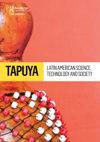Social design, whitening and epistemicide: a Mexican case
IF 1.2
Q2 HISTORY & PHILOSOPHY OF SCIENCE
Tapuya: Latin American Science, Technology and Society
Pub Date : 2022-11-16
DOI:10.1080/25729861.2022.2071097
引用次数: 0
Abstract
ABSTRACT The aim of this article is to analyze the colonial viewpoint that underlies Design, Social Design and their methodology, Design Thinking. We study this theoretical scaffolding and its application in eight projects carried out by designers in the city of Puebla, Mexico, with Indigenous Peoples from different communities in the country. We explore the approach to Social Design and Design Thinking from their historical configuration in articulation with empirical information obtained through interviews with professors of Social Design, the designers of the 8 projects, and with a design studio. Design has been conceived as a neutral discipline although it presents its social dimension as the answer to various problems facing society. This article argues that design has a modern-colonial core that permeates its sub-disciplines, orienting them towards the cultural whitening of populations. The findings show that when implemented, Social Design becomes a practice of cordial racism and a form of epistemicide that give continuity to the attempts to make invisible, eradicate or appropriate the knowledge of Indigenous Peoples. The findings also show that the methodology used by Social Design, Design Thinking, has a fundamental role in contributing and possibly masking this epistemicide.社会设计、美白与认知谋杀:一个墨西哥案例
本文的目的是分析作为设计、社会设计及其方法论——设计思维——基础的殖民观点。我们研究了这种理论脚手架及其在墨西哥普埃布拉市的八个项目中的应用,这些项目由设计师与来自该国不同社区的土著人民共同完成。我们通过对社会设计教授、8个项目的设计师和一个设计工作室的采访,从社会设计和设计思维的历史配置中,结合经验信息,探索社会设计和设计思维的方法。设计一直被认为是一门中立的学科,尽管它将其社会维度作为社会面临的各种问题的答案。本文认为,设计具有现代殖民主义的核心,渗透到其子学科中,使它们面向人口的文化白化。研究结果表明,当实施时,社会设计成为一种亲切的种族主义实践和一种知识灭绝形式,它使土著人民的知识隐形、根除或挪用的企图持续下去。研究结果还表明,社会设计所使用的方法,即设计思维,在促进和可能掩盖这种认知灭绝方面发挥了重要作用。
本文章由计算机程序翻译,如有差异,请以英文原文为准。
求助全文
约1分钟内获得全文
求助全文
来源期刊

Tapuya: Latin American Science, Technology and Society
Social Sciences-Social Sciences (all)
CiteScore
1.60
自引率
0.00%
发文量
39
审稿时长
19 weeks
 求助内容:
求助内容: 应助结果提醒方式:
应助结果提醒方式:


